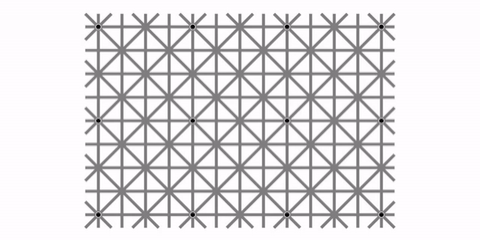We only see what our brain wants to see
Disclaimer: I had a thought about "us seeing only what requires less effort" 2 days ago, the story in the second part of the article. The ideas are with me for some time. Science talks about this also and I found explanations in different books/ courses in the last couple of years. The result is what I disseminated from all those resources and felt is applying to myself
Hypothesis
- Our brain has to work, a lot, to link all new information in an usable way. And by default he is smart and lazy (as good programmers are) and he prefer to user the resources for survival purpose, ignoring the not important things.
- We live in a very dinamic world, surrounded by new stuff every day. This level of excitation would be deadly for our brain if he would have to process everything. So he doesn't. He skips most of the new (exception the ones considered threat and basic needs as food or possibility of reproduction) and reiterates what he already knows for a lower energy waste.
- The reason why is so easy for us to judge others is legitime from our mind perspective. We see things differently and we are always right so they must be wrong.
- When we are tired or our brain focus ability decreases this effect is more visible (for the others, not for us). So I would suggest to visit a new place when you feel refreshed and with a relaxed mind. Leaving in a holiday when we are tired will require an initial sleep period to recharge and only after we'll be able to enjoy the surroundings.
If you want to enjoy more proofs of the brain's way to create shortcuts check the below from AsapSCIENCE:
"An electric toothbrush is not a toothbrush" - quote by my brain
Monday we came back from the see. As the sun was powerful in the last day on the beach I had some neurons burned also and forgot in Constanta the toothbrushes.
When I wanted to use it, it was already quite late with no open store around. I was tired and grumpy as in Bucharest it was terribly hot and I wanted back on the seashore not at work. I gave up brushing my teeth and went to bed.
The second day, in the morning, my boyfriend mode fun of me as I had right in my face, near the toothpaste, my electric brush. I don't like it and usually I prefer the normal one so my brain was ignoring it completely even when I stood in front of it feeling nervous that I have no solution for my problem.
What are my conclusions?
- Life is great and little things like this one make me feel human.
- It's hard not to judge so I should judge less the ones that judge the others.
- My brain deserves an extra hour of sleep to work properly. Until he would get it, I deserve his "revenge".
In the end, a test to check you've watched the clip:
How many dots do you see in the above image? Waiting for your answer in comments.

Interesting. I think i can see 12 dots there but i could only see one at a time. I remember have similar experienment like which ruler is longer and something like that to demonstrate the brain sometimes does not tell you the true reality.
It does not, indeed. Is in our hands to teach him sometimes or at least acknoledge that it's only a perspective
Very true about the brain.. Something we all can relate with. As for the image above, there are twelve dots in there... Nice post.. Followed & upvoted... :)
Glad you liked it:)
There's a difference between the brain omitting information or adding information due to visual limitations or illusions; and the perception of our inner vision. One can be shown the limitations over and over again of the visual device known as the eye and how it can fall for visual illusions, but the mind can learn from it's mistakes, such as learning about visual illusions in order not to be fooled by them. The quality of judgment can increase by developing cognitive faculties.
Yep, totally agree, thanks for the adding. Our brain can be educated to react when seeing and to apply the learned behavior instead of the default one. The question would be: what is the effort to educate in specific cases and if it pays off or not. And how can we establish this.
Haha, that image is messing with my brain! Thanks for the article :)
not my purpose to mess with anything but you're welcome
When I see the picture I see just 1 dots, if I use hand to count all dots in the picture I found 12 dots.
Yep, me too, only one at a time.
He he he, nice game! At a time I can see maximum 2 dots, but in total are 12 dots. :)
Only one for me:D
Indeed, we see only what our brain wants to see, also only what is visible in our constructed "internal reality"